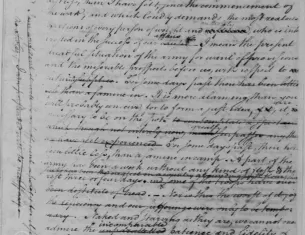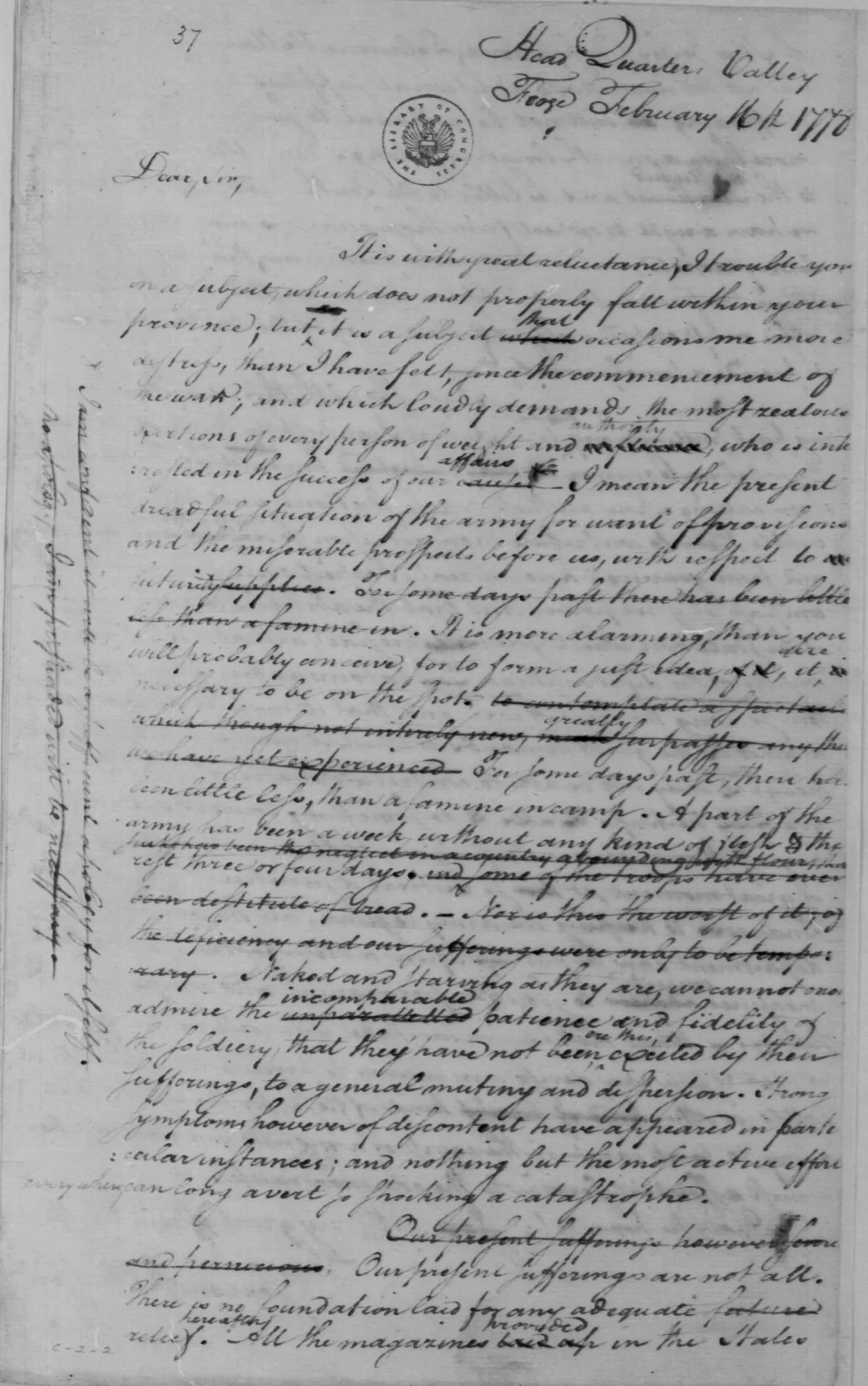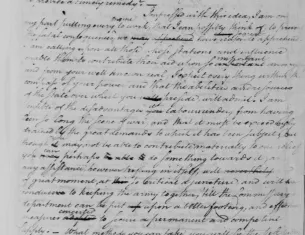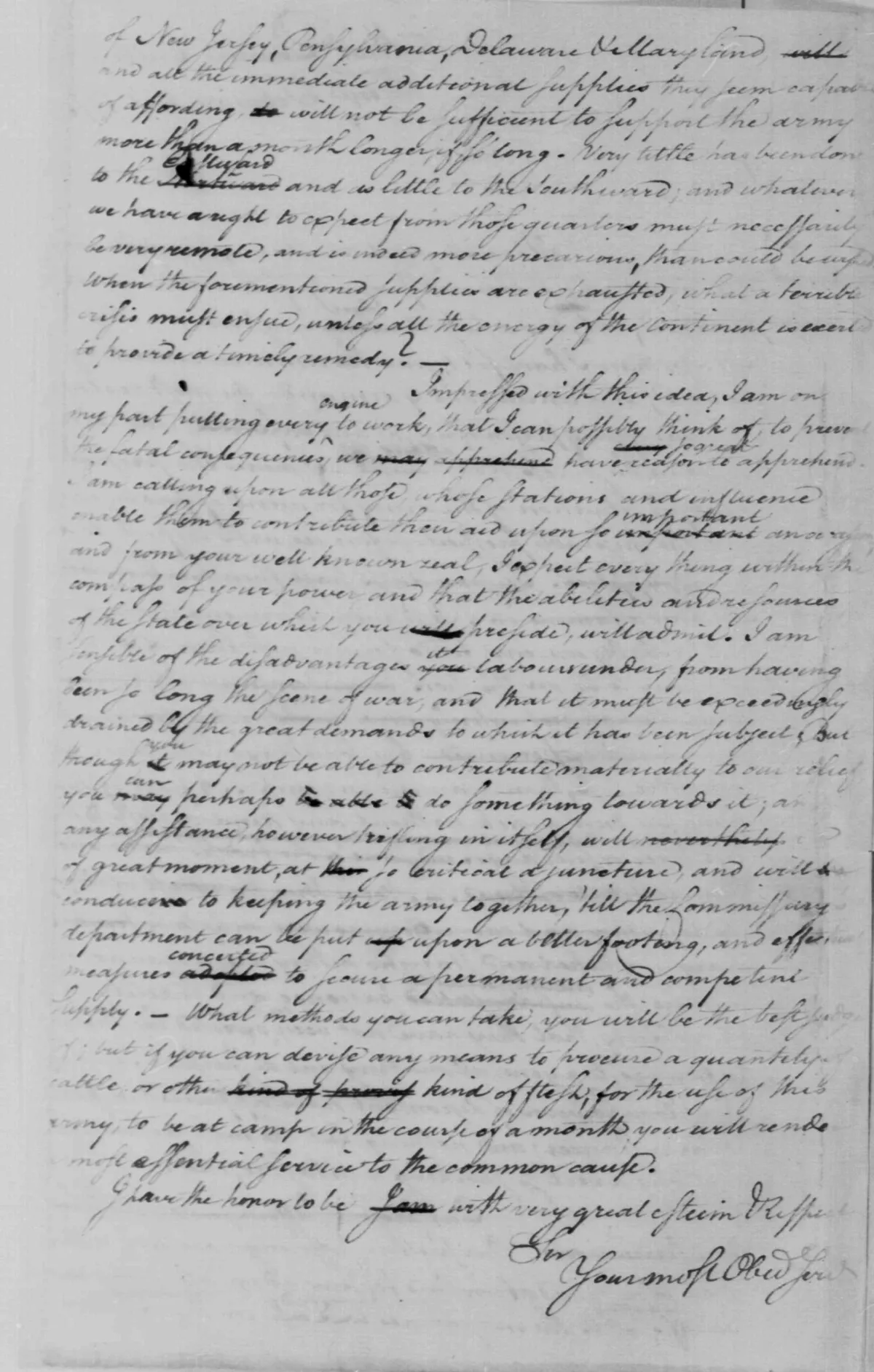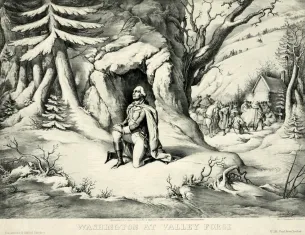George Washington on the Hunger of the Troops, 1778
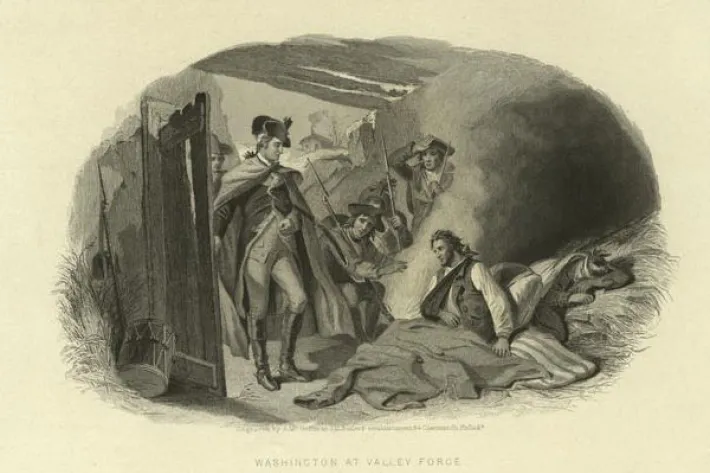
"Washington at Valley Forge" (The New York Public Library Digital Collections)
In this letter written on February 16, 1778, Washington describes an army on the brink of starvation. The situation at Valley Forge was getting worse, and the states and Congress were providing little in the way of supplies, clothing, and food.
A Letter from George Washington to George Clinton, February 16, 1778
Head Quarters, Valley
Forge, February 16th 1778
Dear Sir,
It is with great reluctance, I trouble you on a subject, which does not properly fall within your province; but it is a subject that occasions me more distress, than I have felt, since the commencement of the war; and which loudly demands the most zealous exertions of every person of weight and authority, who is interested in the success of our affairs. I mean the present dreadful situation of the army for want of provisions, and the miserable prospects before us, with respect to futurity. It is more alarming than you will probably conceive, for to form a just idea, it were necessary to be on the spot. For some days past, there has been little less, than a famine in camp. A part of the army has been a week, without any kind of flesh, & the rest three or four days. Naked and starving as they are, we cannot enough admire the incomparable patience and fidelity of the soldiery, that they have not been ere this excited by their sufferings, to a general mutiny and dispersion. Strong symptoms, however of discontent have appeared in particular instances; and nothing but the most active efforts every where can long avert so shocking a catastrophe.
Our present sufferings are not all. There is no foundation laid for any adequate relief hereafter. All the magazines provided in the States of New Jersey, Pensylvania, Delaware & Maryland, and all the immediate additional supplies they seem capable of affording, will not be sufficient to support the army more than a month longer, if so long. Very little has been done to the Eastward and as little to the Southward; and whatever we have a right to expect from those quarters must necessarily be very remote, and is indeed more precarious, than could be wished. When the forementioned supplies are exhausted, what a terrible crisis must ensue, unless all the energy of the Continent is exerted to provide a timely remedy?—
Impressed with this idea, I am, on my part putting every engine to work, that I can possibly think of, to prevent the fatal consequences, we have so great reason to apprehend. I am calling upon all those, whose stations and influence enable them to contribute their aid upon so important an occasion; and from your well known zeal, I expect every thing within the compass of your power and that the abilities and resources of the state over which you preside, will admit. I am sensible of the disadvantages it labours under, from having been so long the scene of war, and that it must be exceedingly drained by the great demands to which it has been subject. But, though you may not be able to contribute materially to our relief you can perhaps do something towards it; and any assistance, however trifling in itself, will be of great moment, at so critical a juncture, and will conduce to keeping the army together, till the Commissary department can be put upon a better footing, and effectual measures concerted to secure a permanent and competent supply.— What methods you can take, you will be the best judge of; but if you can devise any means to procure a quantity of cattle, or other kind of flesh, for the use of this army, to be at camp in the course of a month, you will render a most essential service to the common cause.
I have the honor with very great esteem & Respect
Sir
Your Most Obed Servt
Source: George Washington to George Clinton, February 16, 1778, Papers of George Washington, Manuscript Division, Library of Congress, https://www.loc.gov/item/mgw449501/
A Letter from George Washington to George Clinton, February 16, 1778
Head Quarters, Valley Forge
February 16th 1778
Dear Sir,
It is with great reluctance, I trouble you on a subject, which does not properly fall within your province; but it is a subject that occasions me more distress, than I have felt, since the commencement of the war . . . I mean the present dreadful situation of the army for want of provisions. . . . It is more alarming than you will probably conceive, for to form a just idea, it were necessary to be on the spot. For some days past, there has been little less, than a famine in camp. A part of the army has been a week, without any kind of flesh, & the rest three or four days. . . .
Our present sufferings are not all. There is no foundation laid for any adequate relief hereafter. All the magazines . . . will not be sufficient to support the army more than a month longer, if so long. . . . When the forementioned supplies are exhausted, what a terrible crisis must ensue, unless all the energy of the Continent is exerted to provide a timely remedy? . . .
Though you may not be able to contribute materially to our relief you can perhaps do something towards it; and any assistance, however trifling in itself, will be of great moment, at so critical a juncture, . . . What methods you can take, you will be the best judge of; but if you can devise any means to procure a quantity of cattle, or other kind of flesh, for the use of this army, to be at camp in the course of a month, you will render a most essential service to the common cause.
I have the honor with very great esteem & Respect
Sir
Your Most Obed Servt
Source: George Washington to George Clinton, February 16, 1778, Papers of George Washington, Manuscript Division, Library of Congress, https://www.loc.gov/item/mgw449501/
famine – extreme scarcity of food
magazine – a storage place for arms and ammunition
A Letter from George Washington to George Clinton, February 16, 1778
Head Quarters, Valley Forge
February 16th 1778
Dear Sir,
. . . it is a subject that occasions me more distress, than I have felt, since the commencement of the war—I mean the present dreadful situation of the army for want of provisions . . . For some days past, there has been little less, than a famine in camp. A part of the army has been a week, without any kind of flesh, & the rest three or four days—
. . . if you can devise any means to procure a quantity of cattle, or other kind of flesh, for the use of this army, to be at camp in the course of a month, you will render a most essential service to the common cause. . . .
I have the honor with very great esteem & Respect
Sir
Your Most Obed Servt
Source: George Washington to George Clinton, February 16, 1778, Papers of George Washington, Manuscript Division, Library of Congress, https://www.loc.gov/item/mgw449501/
famine – extreme scarcity of food
Background
In this letter written on February 16, 1778, Washington describes an army on the brink of starvation. The situation at Valley Forge was getting worse, and the states and Congress were providing little in the way of supplies, clothing, and food.
Transcript
A Letter from George Washington to George Clinton, February 16, 1778
Head Quarters, Valley
Forge, February 16th 1778
Dear Sir,
It is with great reluctance, I trouble you on a subject, which does not properly fall within your province; but it is a subject that occasions me more distress, than I have felt, since the commencement of the war; and which loudly demands the most zealous exertions of every person of weight and authority, who is interested in the success of our affairs. I mean the present dreadful situation of the army for want of provisions, and the miserable prospects before us, with respect to futurity. It is more alarming than you will probably conceive, for to form a just idea, it were necessary to be on the spot. For some days past, there has been little less, than a famine in camp. A part of the army has been a week, without any kind of flesh, & the rest three or four days. Naked and starving as they are, we cannot enough admire the incomparable patience and fidelity of the soldiery, that they have not been ere this excited by their sufferings, to a general mutiny and dispersion. Strong symptoms, however of discontent have appeared in particular instances; and nothing but the most active efforts every where can long avert so shocking a catastrophe.
Our present sufferings are not all. There is no foundation laid for any adequate relief hereafter. All the magazines provided in the States of New Jersey, Pensylvania, Delaware & Maryland, and all the immediate additional supplies they seem capable of affording, will not be sufficient to support the army more than a month longer, if so long. Very little has been done to the Eastward and as little to the Southward; and whatever we have a right to expect from those quarters must necessarily be very remote, and is indeed more precarious, than could be wished. When the forementioned supplies are exhausted, what a terrible crisis must ensue, unless all the energy of the Continent is exerted to provide a timely remedy?—
Impressed with this idea, I am, on my part putting every engine to work, that I can possibly think of, to prevent the fatal consequences, we have so great reason to apprehend. I am calling upon all those, whose stations and influence enable them to contribute their aid upon so important an occasion; and from your well known zeal, I expect every thing within the compass of your power and that the abilities and resources of the state over which you preside, will admit. I am sensible of the disadvantages it labours under, from having been so long the scene of war, and that it must be exceedingly drained by the great demands to which it has been subject. But, though you may not be able to contribute materially to our relief you can perhaps do something towards it; and any assistance, however trifling in itself, will be of great moment, at so critical a juncture, and will conduce to keeping the army together, till the Commissary department can be put upon a better footing, and effectual measures concerted to secure a permanent and competent supply.— What methods you can take, you will be the best judge of; but if you can devise any means to procure a quantity of cattle, or other kind of flesh, for the use of this army, to be at camp in the course of a month, you will render a most essential service to the common cause.
I have the honor with very great esteem & Respect
Sir
Your Most Obed Servt
Source: George Washington to George Clinton, February 16, 1778, Papers of George Washington, Manuscript Division, Library of Congress, https://www.loc.gov/item/mgw449501/
Excerpt
A Letter from George Washington to George Clinton, February 16, 1778
Head Quarters, Valley Forge
February 16th 1778
Dear Sir,
It is with great reluctance, I trouble you on a subject, which does not properly fall within your province; but it is a subject that occasions me more distress, than I have felt, since the commencement of the war . . . I mean the present dreadful situation of the army for want of provisions. . . . It is more alarming than you will probably conceive, for to form a just idea, it were necessary to be on the spot. For some days past, there has been little less, than a famine in camp. A part of the army has been a week, without any kind of flesh, & the rest three or four days. . . .
Our present sufferings are not all. There is no foundation laid for any adequate relief hereafter. All the magazines . . . will not be sufficient to support the army more than a month longer, if so long. . . . When the forementioned supplies are exhausted, what a terrible crisis must ensue, unless all the energy of the Continent is exerted to provide a timely remedy? . . .
Though you may not be able to contribute materially to our relief you can perhaps do something towards it; and any assistance, however trifling in itself, will be of great moment, at so critical a juncture, . . . What methods you can take, you will be the best judge of; but if you can devise any means to procure a quantity of cattle, or other kind of flesh, for the use of this army, to be at camp in the course of a month, you will render a most essential service to the common cause.
I have the honor with very great esteem & Respect
Sir
Your Most Obed Servt
Source: George Washington to George Clinton, February 16, 1778, Papers of George Washington, Manuscript Division, Library of Congress, https://www.loc.gov/item/mgw449501/
famine – extreme scarcity of food
magazine – a storage place for arms and ammunition
Excerpt 100
A Letter from George Washington to George Clinton, February 16, 1778
Head Quarters, Valley Forge
February 16th 1778
Dear Sir,
. . . it is a subject that occasions me more distress, than I have felt, since the commencement of the war—I mean the present dreadful situation of the army for want of provisions . . . For some days past, there has been little less, than a famine in camp. A part of the army has been a week, without any kind of flesh, & the rest three or four days—
. . . if you can devise any means to procure a quantity of cattle, or other kind of flesh, for the use of this army, to be at camp in the course of a month, you will render a most essential service to the common cause. . . .
I have the honor with very great esteem & Respect
Sir
Your Most Obed Servt
Source: George Washington to George Clinton, February 16, 1778, Papers of George Washington, Manuscript Division, Library of Congress, https://www.loc.gov/item/mgw449501/
famine – extreme scarcity of food
